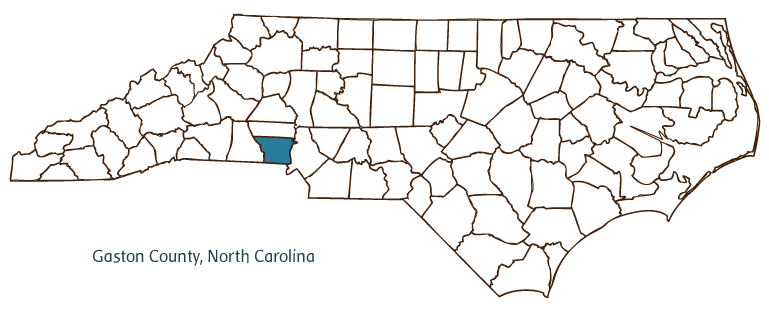Gaston County Resources
- View All:
- Biographies
- Monuments
- locations
Copyright Notice: This article is from the Encyclopedia of North Carolina edited by William S. Powell. Copyright © 2006 by the University of North Carolina Press. Used by permission of the publisher. For personal use and not for further distribution. Please submit permission requests for other use directly to the publisher.

Gaston County, located in the south central Piedmont region of North Carolina, was formed from Lincoln County in 1846. It partially borders the state of South Carolina. The county was named for William Gaston, member of the U.S. House of Representatives and justice of the Supreme Court of North Carolina. The county seat was originally Dallas but became Gastonia in 1911. Other Gaston County communities include Belmont, Bessemer City, Cherryville, Cramerton, High Shoals, Lowell, McAdenville, Mount Holly, Ranlo, Spencer Mountain, and Stanley.
Catawba and Cherokee Indians originally inhabited the lands of Gaston County, but few remained as European colonists arrived. The first settlers were primarily Scotch-Irish, German (including Pennsylvania Dutch), and English. Small, self-sufficient farms characterized early Gaston County, which did not enjoy the agricultural prosperity of some of the other counties. Corn was one of the more abundant crops and often was quickly converted into whiskey. By 1870 Gaston was known as the "Banner Corn Whiskey County of Carolina." In addition to distilleries, the county's early economy was supported by mines that yielded gold, lime, sulfur, tin, and iron in varying quantities.
Belmont Abbey College was established in Belmont in 1876 by the Roman Catholic Order of Saint Benedict. Gaston County experienced an industrial boom beginning in 1845-48, when the construction of three cotton mills laid the foundation for a textile industry that became vital to the county. A labor dispute at the Loray Mill in Gastonia erupted in violence in 1929. Workers attempting to organize a union were charged with being communists, and the strike was violently suppressed. Textiles continue to dominate Gaston County's industrial structure, although its industrial base has become more diversified. In 2004 the population of Gaston County was estimated at 192,000.
For an annotated history of the county's formation, with the laws affecting the county, boundary lines and changes, and other origin information, visit these references in The Formation of the North Carolina Counties (Corbitt, 2000), available online at North Carolina Digital Collections (note, there may be additional items of interest for the county not listed here):
County formation history: https://digital.ncdcr.gov/Documents/Detail/the-formation-of-the-north-ca...
Index entry for the county: https://digital.ncdcr.gov/Documents/Detail/the-formation-of-the-north-ca...
Reference:
Additional resources:
Corbitt, David Leroy. 2000. The formation of the North Carolina counties, 1663-1943. https://digital.ncdcr.gov/Documents/Detail/the-formation-of-the-north-carolina-counties-1663-1943/3692099?item=4553233 (accessed June 20, 2017).
Gaston County Government: https://www.gastongov.com/
Gaston Regional Chamber of Commerce: https://www.gastonbusiness.com/
DigitalNC, Gaston County: https://www.digitalnc.org/counties/gaston-county/
North Carolina Digital Collections (explore by place, time period, format): https://digital.ncdcr.gov
Image credits:
Rudersdorf, Amy. 2010. "NC County Maps." Government & Heritage Library, State Library of North Carolina.
Criner, Allyson C. "Gaston County." NCpedia. State Library of NC. 2006. https://www.ncpedia.org/geography/gaston.